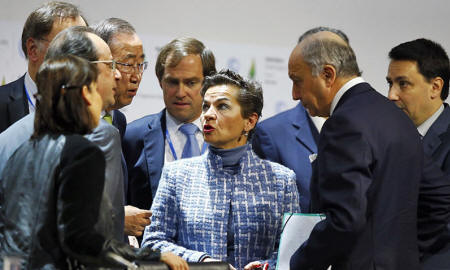The Paris climate agreement kindled "a huge flame of hope", establishing a new model of 21st-century diplomacy, the woman behind the deal has declared.
In her first public reflections on the climate accord signed in December, Christiana Figueres, the UN climate change official, said that after two decades of meandering negotiations, countries had at last discovered their "higher purpose" and risen to the challenge of dealing with global warming.
The Paris agreement, in which 195 countries committed to limiting the temperature increase to well below 2°C, set a new standard for dealing with complex global problems, she said.
"Climate change is a very, very good example of how we are moving to a completely new social contract from the last century," Figueres told the Guardian at a conference hosted by the International Renewable Energy Agency (Irena) in Abu Dhabi.
"The social contract that is going to underpin the 21st century has at least five very, very different ways of dealing with challenges and very different ways of delivering solutions.
"To have Paris is a huge flame of hope. We can really take some confidence from there that if we decide we want to do something, then we can," said Figueres, who will step down this summer after guiding the negotiations for six years.
"We are not bound by situations we are confronted with. We can rise above them. It's fantastic."
A number of key players in the Paris climate deal attended the annual Irena conference at the weekend.
More than 80 countries committed in their climate plans in Paris to expand their use of solar and wind power as a way of reducing greenhouse gas emissions. These countries are now looking for financing and technological assistance to make the switch to cleaner energy sources.
Figueres said countries had overcome multiple fault-lines to arrive at a deal in Paris - the divide between rich and poor countries, between the public and private sector, between different regions.
Unlike other negotiations, the Paris climate talks involved governments, business leaders and campaign groups.
A number of foreign policy experts have held up Paris as a new model for diplomacy, and commentators have praised the French hosts for skillfully guiding the talks to a successful resolution.
"It is the way that we are going to operate increasingly in the 21st century," Figueres said.
The agreement abandoned the idea of a traditional international treaty with clear rules and fixed obligations, in recognition that the US would never sign on to an agreement that needed approval from a Republican-controlled Senate.
Instead, the agreement relied on countries to come forward with plans for cutting greenhouse gas emissions and then to review those plans at regular intervals to make even deeper cuts.
Anne-Marie Slaughter, a former US Department of State official and president of the New America Foundation, wrote of the deal in December:
"By the standards of a traditional treaty, it falls woefully short.
Yet its deficits in this regard are its greatest strengths as a model for effective global governance in the 21st century. The Paris agreement is a sprawling, rolling, overlapping set of national commitments brought about by a broad conglomeration of parties and stakeholders.
It is not law. It is a bold move toward public problem-solving on a global scale.
And it is the only approach that could work."
But there have also been a number of high-profile critics of the Paris agreement.
James Hansen, the climate scientist, dismissed the agreement as a fraud. Bernie Sanders, the Democratic presidential contender, said the deal went nowhere near far enough.
Figueres said the 31-page agreement had exceeded her expectations.
"The surprise for me was actually the clarity of the text and the way in which governments worked with each other to get to common ideas," she said.
"In previous negotiations, people have got so caught up with the wording itself - this comma, that comma, that verb - that they tripped over themselves and were not able to reach for the stars. In this case they first reached for the stars and then thought: how do we express that?"
She said Paris was the first time in six such climate meetings that she never had a moment when she feared it would all end in a collapse.
"At every other one there was at least one moment in which I thought we are going to lose this whole thing," she said.
"This was the first time in which it was so evident that there was overwhelming, not just political will, but political determination to actually come to an agreement."
And not just an agreement for the sake of it, she said.
"The overriding current was getting to an agreement that they could all be proud of. It wasn't just for a photo."


